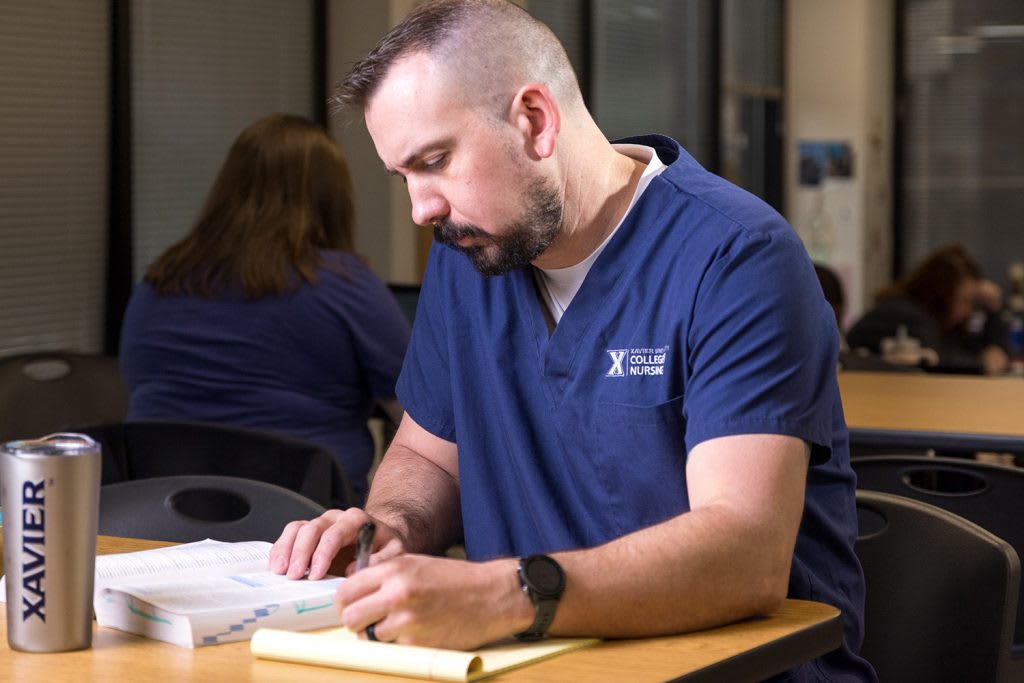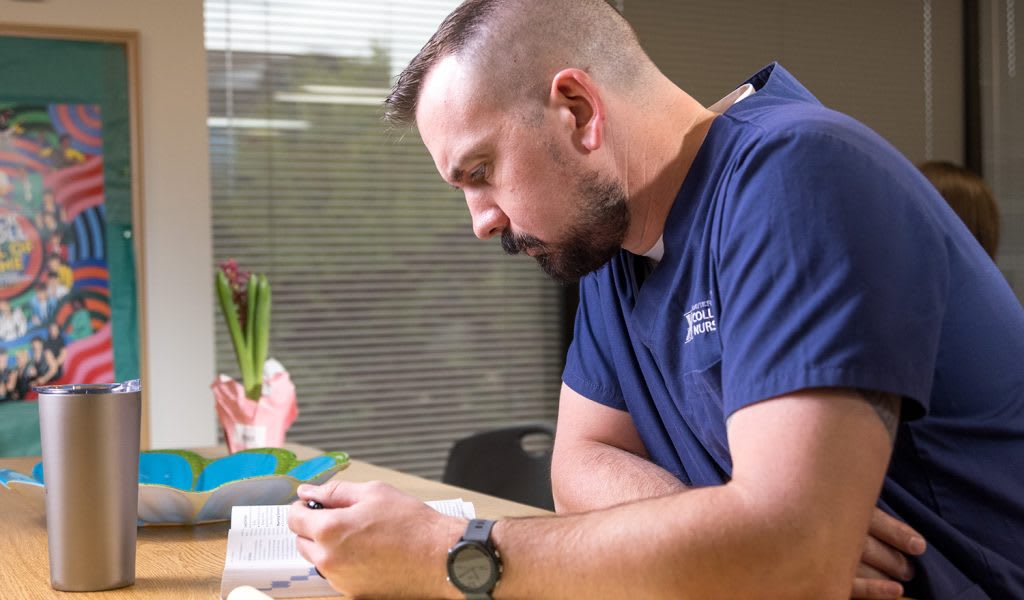How to Prepare for the NCLEX: 9 Steps
Each blog post is dated and contains accurate information as of that date. Certain information may have changed since the blog post publication date. If you would like to confirm the current accuracy of blog information, please visit our ABSN program overview page or contact us at 866-890-9467.
Wondering how to prepare for the NCLEX and, particularly, how to pass the NCLEX on your first attempt? It all starts in your first semester in nursing school. Begin preparing early, set aside consistent weekly studying time, use active studying techniques, and focus on stress management.

Any test can be a little nerve-wracking, especially one that holds the ticket to your future in nursing. If you’re like most nursing students, you may be wondering how to prepare for the NCLEX. Every nursing school graduate must pass the NCLEX (National Council Licensure Examination) to obtain state licensure. Here, we’ll explore how to pass the NCLEX with some actionable NCLEX tips and strategies.
At Xavier University, our 16-month Accelerated Bachelor of Science in Nursing (ABSN) program prepares you to succeed on the NCLEX and graduate as a practice-ready nurse. With our thorough nursing curriculum and NCLEX prep resources, you’ll be well-positioned to tackle the licensure exam.
Is the NCLEX Hard?
One of the most common questions aspiring nursing students have is, “Is the NCLEX hard?” Yes, it’s a challenging exam—with good reason. Nurses are responsible for protecting and promoting their patients’ health, safety, and well-being. The purpose of the NCLEX is to ensure licensed nurses have the knowledge, skills, and clinical judgment necessary to provide appropriate care for their patients.
As such, passing the NCLEX requires strong critical thinking skills, excellent clinical judgment, and the ability to apply a vast amount of nursing knowledge to specific clinical situations. Although the NCLEX is undoubtedly challenging, following actionable NCLEX tips can help you prepare for the test, giving you greater confidence as you head into the testing center.

Learn how to get into an accelerated nursing program and start your nursing journey at Xavier.
How to Prepare for the NCLEX: Your Complete Guide
Although you won’t take the NCLEX until you’ve graduated with your nursing degree, you should begin preparing for it shortly after you start school. Passing the NCLEX requires months of preparation. As early as your first semester at Xavier, you can begin figuring out how to study for the NCLEX. It all starts with understanding the format of the test.
1. Understand the Test Format
The NCLEX was recently overhauled to add new questions and a heavier emphasis on assessing critical thinking skills and clinical judgment. Now called the Next Gen NCLEX (NGN), the test is five hours long, with a minimum of 85 questions and a maximum of 150 questions.
The number of questions you’ll answer—and the exact questions you’ll face—are determined by your answers to previous questions. The NGN is a computerized adaptive test (CAT). If you answer a question incorrectly, the next question will be easier, and vice versa. The test is designed in this way to ensure all nursing candidates see questions appropriate for their ability level.
The questions on the Next Gen NCLEX will require you to draw upon your nursing knowledge to perform the following tasks:
- Observe and evaluate clinical situations
- Identify the prioritized patient concern
- Develop the most appropriate, evidence-based clinical response
In other words, there may be more than one correct answer. In some cases, all available answers may be correct. Your task is determining which answer is most appropriate given the clinical situation.

2. NCLEX Tips for Easing Test Anxiety
We understand a certain amount of pressure is involved when taking the NCLEX, and nervousness is normal. If you get test anxiety, one of the most helpful steps you can take is creating a plan to manage your stress.
Here are a few tips and tricks to ease your anxiety leading up to exam day:
- Study a little bit every day. Beginning in your first semester of nursing school, dedicate a regular period to studying for the NCLEX. This way, you’ll have that knowledge to fall back on and the peace of mind of knowing you’ve consistently prioritized the test.
- Don’t forget self-care. Make sure you are exercising, going outside, drinking water, and doing activities you enjoy. This will keep you in a good headspace and help manage your stress. Balance is essential for any nursing student, especially those preparing for the NCLEX.
- Know the details. Before the test day, research where to park, what time to be there, and what supplies you may need to bring—including any documentation or ID. This way, you won’t have to think about these details right before the test. Don’t try to cram; take some time to breathe and relax before heading for the exam.
- Practice relaxation techniques. Try various methods to find one or two that work for you, such as deep breathing, mindfulness meditation, and progressive muscle relaxation.
3. Use a Variety of Studying Techniques
It’s a common belief that people have a set learning style, such as that one person might be a visual learner who retains information best when reading it, while another is an auditory learner who benefits most by listening to lectures. Unfortunately, the idea that people have an established learning style is a myth not supported by any scientific evidence.
If you limit yourself to only one set of studying techniques, you may be missing out on valuable opportunities. Instead of working through materials based on any particular learning style, trying various studying techniques, particularly active ones (see tip #6 below), is best. Try a wide range of NCLEX prep materials, such as:
- Flashcards
- Charts
- Instructional videos
- Practice questions

4. Set Goals
Entering your planned study sessions with intention can be instrumental in helping you prepare for the NCLEX. If you’re working through an NCLEX guidebook, plan out the pages or chapters you want to get through. You can also set a certain number of practice test questions to answer, topics to master, or situations to understand.
Another way to approach setting goals is to think of it as a roadmap or plan for how to pass the NCLEX. Look at your current schedule and determine how much time you can devote to weekly studying. Then, set the goal of consistently reaching that amount of study time.
However you choose to go about it, as long as you know what you want to get out of your study sessions and how to reach those goals, you’ll be well on your way to being prepared.

What is nursing school like? Dive into this blog, which explains what to expect during your first semester as a nursing student.
5. Find NCLEX Resources
Xavier offers numerous NCLEX prep resources to all our nursing students, and you may be satisfied to work through these. However, you could also look beyond our resources to find additional materials online.
The National Council of State Boards of Nursing (NCSBN), the body that develops the NCLEX exam, offers resources on its website. From test plans and practice exams to NCLEX guides and candidate rules, you’ll want to check out what the NCSBN offers to prepare for the NCLEX.
Additionally, many test guides and practice worksheets are available at bookstores and online test prep sites. You can also look for “question of the day” resources, giving you one NCLEX question to work through each day. Consider installing an NCLEX prep app on your smartphone to make good use of spare minutes (e.g., waiting in line at the bank, etc.).
6. Use Active Studying Techniques
There is a distinct difference between passive and active studying. Active techniques engage the brain and are associated with better memory retention and learning outcomes than passive studying. Passive studying includes re-reading textbooks and notes. Active studying techniques include the Feynman Technique, which involves the following steps:
- Identification: Before opening a textbook or checking your notes, take a blank sheet of paper and write down everything you remember about a topic.
- Simplification: Take another sheet of paper and rewrite everything you remember—but in the simplest possible terms as if you were teaching it to a child.
- Review: Now, open the textbook or other learning materials and review the topic, identifying any info you missed and adding it to your second sheet of paper.
- Refine: Lastly, clearly organize your notes, perhaps by adding color coding or diagrams.

In addition to the Feynman Technique, try other active studying methods, such as:
- Explain the material in your own words out loud.
- Develop and write down questions as you work through the material.
- Relate nursing concepts to real-life examples/case studies.
- Participate in group discussions about the topic.
- Teach the topic to someone else.
7. Learn Key Nursing Mnemonics
Another way to solidify nursing concepts in your mind is to use nursing mnemonics. For example, a nursing mnemonic to help you remember the signs of right-sided heart failure is AW HEAD:
- A: Anorexia and nausea
- W: Weight gain (fluid retention)
- H: Hepatomegaly
- E: Edema (bipedal)
- A: Ascites
- D: Distended neck vein
On the other hand, the standard mnemonic to remember the signs of left-sided heart failure is DO CHAP:
- D: Dyspnea
- O: Orthopnea
- C: Cough
- H: Hemoptysis
- A: Adventitious breath sounds
- P: Pulmonary congestion
8. Take Practice Tests
Answering practice questions and taking full-length practice NCLEX tests are forms of active studying that can help you:
- Remember information better
- Become more comfortable with the test format and question types
- Conduct self-assessments and identify the areas you need to work on

Even if you’re a first-semester nursing student, you can start by working through practice questions and tests. Some online resources that offer free questions and tests will also explain the answer.
At first, it’s perfectly fine (and expected) if you get all or most questions wrong. You’ve just started nursing school, after all. Getting questions wrong is a valuable learning opportunity when you take the time to reflect upon the provided explanation of the correct answer. Over time, you’re likely to find yourself getting more questions right.
9. Set Yourself Up for Success on Test Day
Make sure to get a full night’s sleep before the test. You’ll want to arrive rested and ready for the exam, which you won’t get from a late night of last-minute studying. Ensure you eat a balanced breakfast, pack a lunch or snack and bring water. While you may not be able to eat in the testing room, the exam can take a long time, and you may be granted a break to eat.
Remember that you can choose the date and time of your exam, so pick a schedule that will work to your advantage. If you want to take it first thing in the morning to get it off your mind, you can! However, you also have the option to take it later in the day if you’d rather sleep in and take your time.
Make sure to arrive early and bring all the materials you need, such as the accepted forms of identification. Finally, have confidence in your abilities and the effort you’ve put into studying over the last few months. It may help to have something to look forward to after the exam. For example, schedule a dinner with friends afterward to decompress.
How to Pass the NCLEX with Help from Xavier

Still wondering how to study for the NCLEX? One way is to enroll in a high-quality nursing program like Xavier’s ABSN program. Our curriculum is designed to graduate practice-ready nurses who can tackle the NCLEX with confidence.
In addition, we offer several NCLEX prep resources in the ATI Nursing Education platform. Every nursing student here has access to these valuable resources, which include an online tutorial system, online pharmacology flashcards, critical thinking methodology frameworks, and much more. We’re proud to offer extensive student support resources because your success is ours.
Contact an admission counselor today to begin applying to our ABSN program.
